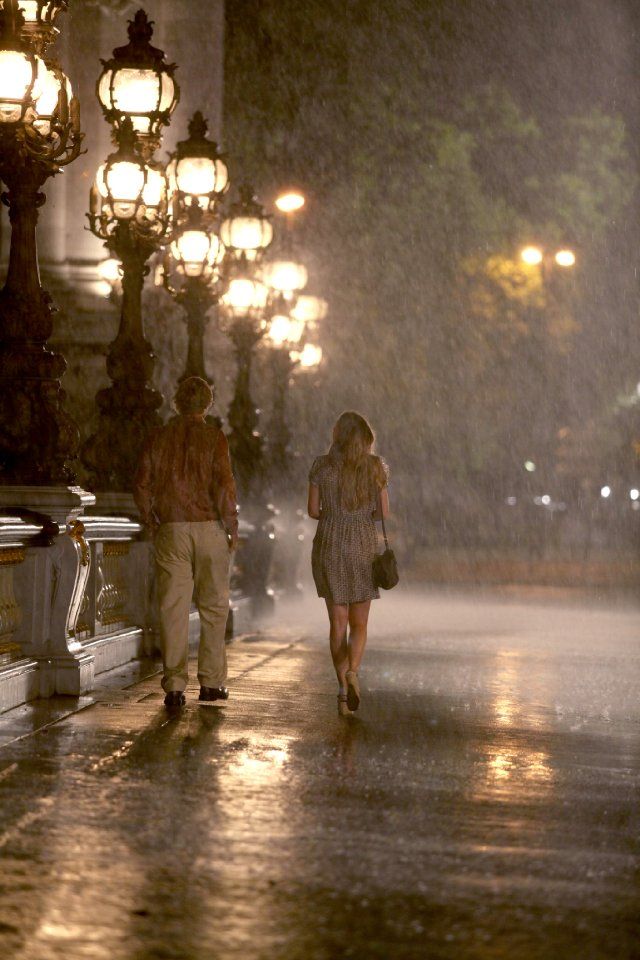Why did I drop this gobbler in my Netflix queue? It got good reviews. Said to be romantic. Nostalgic. Cooked in Allen's brain, it would have at least a few good lines of dialogue, I figured. Wrong.
This is such a silly, ultra-"high concept" script that no producer would have taken a pitch meeting for it had anyone but Woody Allen put it on the table. He can recruit name actors and probably brings his films in on budget, and I suppose they almost all make money.
You're to lose your heart to the City of Light, bask in the glamour of it all, and pat yourself on the back for recognizing famous literary and artistic characters from Paris's past while Allen sticks his Concept up your nose.
Concept: Goofy Hollywood screenwriter (Owen Wilson), engaged to crass socialite (Rachel McAdams), wants to prove he's a real artiste by writing a "serious" novel. On a trip to Paris with his fiancée and her stiff parents, screenwriter finds himself in time warp bouncing back to the '20s. With no trouble at all (and no suspicions from anyone about his 21st century clothing and occasional modern expressions), he's swanning about with Scott, Zelda, Cole, Pablo, Salvador, etc.
Psst, look, he's talking lit'ry matters with Ernest Hemingway, who could talk of these things and could write about love and death because he knew love and death, and to know those was to pay out a sentence straight and true like a fishing line with a great flounder at the end, so great that he had never seen such a flounder.
Hey, there's Gertrude Stein and Alice B. Toklas! Nudge-nudge, T.S. Eliot! Belmonte the Bool-Fighter who wrote poems in blood on the sand and was graceful under pressure! Few of these luminaries do or say much, but as noted, they are a form of cinematic name dropping so audiences can tell themselves how cultured they are.
The setting bounces back and forth like a tennis ball between past and present; fiancée and troglodyte parents get ever more obnoxious; screenwriter meets charming (present-day) antique gallery owner. Back in the '20s, he flirts with Picasso's (I think) abused mistress.
Not only has Picasso (I think) done her wrong, but she's nostalgic for Paris's Golden Age. The '20s, what a drag. She longs for the Belle Epoque, and through some further bit of time origami, she and the screenwriter travel back a further generation. They're in Maxim's, with can-can girls and Toulouse-Lautrec and Gauguin and Degas. But only for a brief stopover, and our poor Hollywood sap is back in today's Paris.
Well, not really. It's a fantasy too, cleaned up the better to swoon over. Other than a few graffiti here and there (surprising the film crew didn't paint them over), this is the Paris of TV perfume commercials. No veiled women, traffic jams, loud storefronts. You'd never dream the city is ringed with high-rise projects occupied by North African gangs, "no-go" areas even for the police and where the local sport is setting cars on fire.
To give Allen credit, he does have a talent for creating lovely images of vanished days. Even while you're conscious of the manipulative artifice and aware of the clichés (including the repetitive Django Reinhardt-ish riffs on the soundtrack), it's possible to captivated by the ambience, costumes, and some lovely ladies including the exquisite Marion Cotillard.
But Allen won't even let us keep our innocent pleasure. In the end we're told by the wised-up screenwriter that all that Golden Age stuff is a crock. Every generation imagines a previous era to have been better, he says. He and Picasso's mistress (I think) were fooling themselves. We were suckers for letting Allen take us in with his nostalgic finery.
There's no point in commenting on the acting, since all anyone was asked to do was play a caricature. I'd never seen Owen Wilson before, probably because I never want to see the kind of movies he's starred in, and nothing he does here leaves me eager to re-make his acquaintance.





4 comments:
I saw that film too. I liked it, sort of. Paris is a great city with a great history. But yes, the film treats this history superficially. I didn't like the protagonist much, a silly liberal with in-laws who are silly caricatures of conservatives.
Honestly, nobody French would have Degas, Gauguin, or Toulouse-Lautrec fraternizing with cancan girls AT MAXIM'S....Not the sort of entertainment place those genuine artists liked ; a pub in the suburbs, le Moulin Rouge were their favourite eating, drinking and "loving" dens!
Not seen this, didn't even know about it. But I'll take your word for it, not even worth downloading.
I've not been a fan of Woody Allen anyway, and obviously this won't change my mind.
As I write this 'my' black cat is curled up on my lap,
you've got this movie all wrong and it's hilarious. allen is making fun of the nostalgia people have for past times - of their habit of romanticizing the past and failing to live in the present. That's why all those not-so great parts of Paris in the 20s weren't included. It is a wonderful film.
Post a Comment